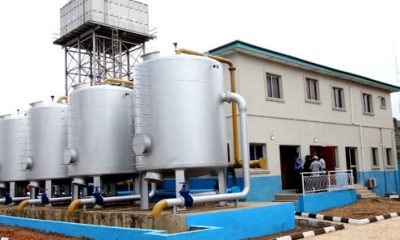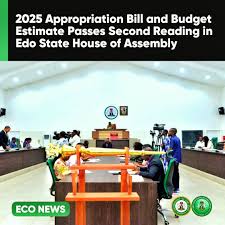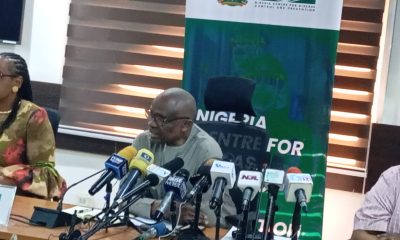Agriculture
FG Sensitises Bakers in A’Ibom on Importance of OFSP
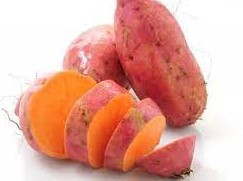
The Federal Government through the Ministry of Agriculture and Rural Development has sensitised bakers and caterers in Akwa Ibom on the benefits of the inclusion of Orange Fleshed Sweet Potato (OFSP) puree in bread making.
Hajia Karima Babangida, Director, Federal Department of Agriculture, said this in her keynote address at a one-day workshop organised for stakeholders in the baking industry held in De-Wieggan bakery, Ikot Ekpene on Thursday.
Babangida, who was represented by Dr Uyobong Uko, State Coordinator, Green House in Akwa Ibom, said that in the light of the recent increase in the price of bread, OFSP puree offered suitable alternative for composite bread baking and other confectioneries.
She added that with the inclusion of potato pure, cost of production would be brought down to about 40 per cent.
“In the pursuit of food security and nutrition for our country, OFSP is readily available to be utilised and processed into various products, to achieve these value addition objectives.
“There are lot of product development potentials from Orange Fleshed Sweet Potato needed to be brought to the awareness of bakers and caterers in the catering and baking industry,” Babangida said.
The director said the inclusion of the potato puree in bread baking would also create more jobs for young Nigerians.
According to her, apart from creation of jobs for the teeming population, potato in bread baking would also improve bread’s nutritional value as it contains vitamin A.
“It is very important to look in the direction of product development to create jobs for the teeming youths as well as source of income generation for our women.
“There is no controversy that the health and wealth benefits of OFSP due to its beta carotene content which is a pre-cursor of vitamin A makes it to be adequate food to boost immune system of the elderly and helps in combating Vitamin A deficiency among children,” she said.
She urged participants at the workshop to make good use of the opportunity offered and acquire requisite skills and knowledge to help make food more affordable in the state and the country.
In her remark, the Commissioner for Agriculture in Akwa Ibom, Dr Glory Edet, commended the Federal Government for bringing the workshop to the state.
Edet, who was represented by Mr Solomon Joe, Director Planning, Research and Strategy (PRS) in the ministry said that since almost all the materials used for baking bread were imported, there was need to look inward to potato puree in baking bread.
She said that as part of measures to ensure availability, the state government has concluded plan to establish a puree factory in the state.
She urged farmers in the state to commence planting of potatoes in large quantities , saying it could grow easily across the state.
In his paper titled: “Orange Flesh Sweet Potato (OFSP) Value Addition for the Nutrition Security and Sustainable Income Generation in Nigeria” Dr Wasiu Oyediran, said that given the prevailing economic crisis in Nigeria which had escalated the prices of staple foods, OFSP was becoming one of the best alternatives.
Oyediran said the production and cultivation of OFSP was on the increase in Nigeria, adding that the country is the single largest producer of OFSP in Africa.
He said that the value addition would focus on perishable crops after harvest to reduce losses, enhance financial and nutritional crop-value, and ensure food safety.
“Adding value to OFSP offers good potential for income generation and employment as well as for enhanced utilisation of the crop.
“This provides a means of reducing poverty, improving food security and nutrition by developing small and micro-enterprises by commercializing OFSP and potato-based foods and feeds,” he said.
Responding on behalf of the Association of Master Bakers and Caterers of Nigeria, Akwa Ibom Branch, the state Chairman, Mr Edem Edem, said the workshop was another bold effort by the Federal Government to empower master bakers in the state.
Edem commended the FG for the step taken to provide alternative means of boosting bread production through the use of potatoes flour as a new means of encouragement to all bakers nationwide.
The participants at the event were drawn from the 31 local government areas of the state. (NAN)
Agriculture
Experts urge Media to Present Information on Genetically Modified Foods Objectively

The National Biotechnology Research and Development Agency (NBRDA) has urged the media to stand in the communication gap in favour of biotechnology development n Nigeria, re-affirming the safety in the consumption of genetically modified foods.
Prof. Abdullahi Mustapha, Director General/Chief Executive Officer of the agency, affirmed this during a one-day media field trip to NBRDA FARMS on Monday in Abuja.
The trip was organised by Open Forum On Agricultural Biotechnology (OFAB), an initiative of the African Agricultural Technology Foundation (AATF).
“Today, you shall be visiting our TELA Maize farms. This provides an exciting opportunity to see for yourselves what we have been doing here and equally gather your findings on what you have seen today and then take back the message to the people to quell some of the miscommunications about Genetically Modified Organisms (GMO) crops.
“TELA Maize hybrid varieties were developed to address some of the pressing challenges facing our farmers, including pests and diseases that can significantly reduce crop yields,” he said.
According to him, the production of the TELA MAIZE hybrid was done through the combined efforts of scientists at the Institute for Agricultural Research (IAR), Zaria in collaboration with stakeholders in key institutions such as NBRDA, NBMA, NASC, and the AATF Research Team.
“We are here to showcase our demonstration farms of genetically modified versions of commonly consumed crops developed by our scientists that have enjoyed rave reviews from the global world of science and the agricultural sector.
“These experts have worked tirelessly to ensure that this crop is not only high-yielding but also safe for human consumption,” he added.
He noted that the National Biosafety Management Agency (NBMA) has been instrumental in ensuring the safety and efficacy of TELA Maize which is believed to have the potential to transform the agricultural landscape in Nigeria and beyond.
Dr Jean Baptiste, the Regional Representative of the African Agricultural Technology Foundation, said that GMOs were aimed at leveraging the potential of biotechnology to develop a system that will help farmers.
He said Tella maize is a variety, developed using biotechnology methods to control insects.
“It also checks the resistance to drought and controls army worms, and stem borers in maize.
“At the end of the day, the benefits are enormous because it helps farmers increase yield and to be able to meet food security issues.
Dr. Francis Nwankwo, a TELA MAIZE developer from the African Agriculture Technology Foundation (AATF) explained the processes saying Tela maize passed through a genetic transformation that happens at the DNA level .
“They are not manufactured. What happens is we identify genes that can inhibit the infestation or reduce the infestation of some lepidoptera pests that affect some crops.
“So when we identify those genes we incorporate them into the DNA of maize thereby making it the maize, plus the genes.
“That way we increase the genes and reduce the struggles that our conventional maize go through on our farms like the stem borrower and others,” he said.
In her presentation, Dr Rose Gidado, Director, Agricultural Biotechnology Department, NBRDA, explained that many countries have derived huge benefits from TELA maize citing countries such as the U.S. and Canada.
“We actually brought you here so you could see the disparities between the TELA MAIZE and the non-TELA MAIZE species, and the environment which is far different from what we see on social media.
“We have other crops like beans that have actually been through the same gene transfers and are doing perfectly well and are safe for consumption,” she said.
She, therefore, urged the media to be on the guard in view of a lot of misinformation going round on social media and take responsibility in providing related information to the public adequately and objectively. (NAN)
Agriculture
Epe LG Empowers 200 Farmers to Boost Food Production
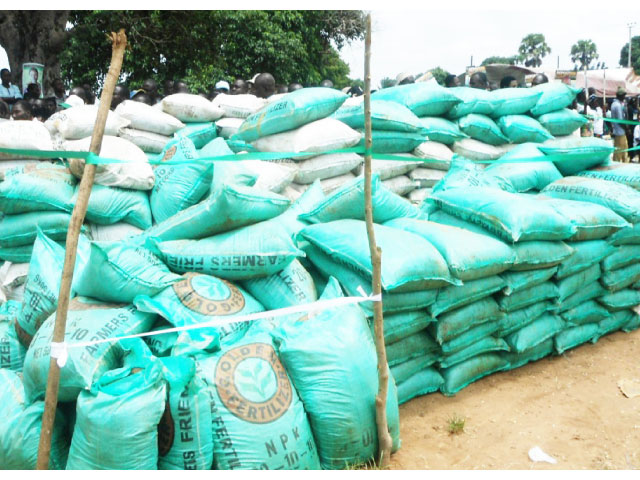
Ms Surah Animashaun, the Chairperson, Epe Local Government, has empowered 200 farmers with cash and other agricultural inputs to boost food production in the area.
Animashaun distributed the agricultural inputs to the beneficiaries at the council secretariat in Epe on Thursday in Lagos.
She said the initiative was aimed at supporting farmers in order to boost food production in the various communities of the council.
Animashaun said the farmers who benefitted from the gesture are expected to be considerate in their price fixing after harvest to ensure the affordability of food for all Nigerians.
“With the economic situation now and the support being giving to you, farmers should be reasonable in fixing prices after harvest to ensure that ordinary Nigerians source food at a more convenient price nationwide.
“We are here to give you support for your farming activities today, we expect that you reciprocate tomorrow by selling at a more affordable price to the people tomorrow,’’ she said.
Animashaun explained that each of the benefiting farmers received N50,000 and essential grains such as maize and sorghum.
She said the council would continue to support the farmers for them to be strong in farming activities.
Animashaun also used the medium to highlight her administration’s ongoing efforts in the extension of palliatives to other sectors of the economy.
She urged the communities in the area to maintain harmony, love, hospitality, and compassion, particularly in the face of the present economic challenges.
Also speaking, Mr Sikiru Owolomoshe, the Vice Chairman of the council, urged the farmers to take advantage of the gesture to improve their activities in order to encourage others.
Mr Olayinka Kazeem, the Secretary of Epe Farmers and a beneficiary, expressed gratitude to the council chairperson and her management.
“This is the first time we are witnessing this kind of programme and it is coming at a critical period when many states are facing food shortage,’’ he said.
He assured that the beneficiaries would do their best to ensure the objective was achieved.
Mr Ahmed Surakat, the Public Relations Officer of Lagos State Fishermen Cooperative Association, and Mrs Kafilat Animashahun beneficiaries, extended their gratitude to the council chairman for her unwavering support to farmers.
Earlier, the President of the Epe Farmers Union, Mrs Aminat Shabi, lauded Animashaun for the comprehensive support to other agricultural value chain such as fish farmers and livestock producers.(NAN)
Agriculture
Food Security Achievable Through RAAMP, Says National Coordinator

By Tony Obiechina, Abuja
The Rural Access and Agricultural Marketing Project (RAAMP) has been described as an appropriate and very effective means of realising food sufficiency and security across the country.
The National Coordinator of RAAMP, Engr Aminu Bodinga Mohammed who made the assertion during the 7th Joint World Bank and French Development Agency Implementation Support Mission of RAAMP at the Shehu Musa Yar’Adua Centre, Abuja, pointing out that most urban centers derive their supply of food from farms, which are located at the rural communities.
His words: “the primary objective of RAAMP is to improve rural roads and trading infrastructure through to boost food production.
Therefore the successful implementation of this project could go a long way towards guaranteeing food sufficiency and security across the country”.He solicited for concerted efforts by all stakeholders to ensure an all-round success of the project.
Aminu noted that the mission was to evaluate the current implementation status, milestones as well as challenges faced by the 19 states participating in the project and announced that arrangements had reached an advanced stage for the commencement of civil works on agro-logistics centers (ALCs) latest by September, 2024 with 23 major contracts that would be awarded across the states.
ALCs refer to market hubs that have been prioritised for transformation to ultra-modern standards at various locations across the country , notably in rural communities to empower and enhance the livelihoods of the people.
Also speaking, the Task Team Leader of the World Bank, Mr. Rakeesh Tripathi hinted that a scale-up was being mooted for the project but emphasized that only states which must have established and operationalised the Rural Access Road Agency (RARA) and State Road Fund (SRF), backed up with the required standing on counterpart funds would be eligible to access the scale-up funds.
He therefore advised all states to take advantage of the mission and get the needed support to tackle every challenge facing their State Project Implementation Unit (SPIU), adding that all the 36 states and the Federal Capital Territory would be encouraged to embrace the scale-up project.
Highpoints of the exercise were presentations by the State Project Coordinators of the respective participating states, question and answer sessions, comments and observations, among other inputs by the stakeholders.
The Task Team Leader of the French Development Agency, AFD; Consultants from the World Bank; the Federal Project Management Unit, FPMU as well as State Project Implementation Units, SPIUs of RAAMP also attended the mission.





